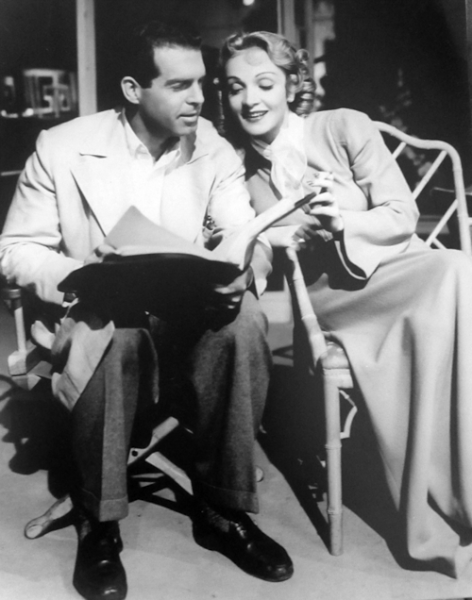 |
| Totally unrelated. Fred MacMurray & Marlene Dietrich on the set of The Lady is Willing.;) |
Marlene's will, which is quoted in a September 1992 decree granting probate, dates back to March 7, 1964--over 28 years before her death. Could this have been around the time when Marlene started having serious health problems, such as when she was diagnosed with cervical cancer? Mischa Spoliansky (a longtime friend of Marlene's, who played piano on her first recording, "Wenn die beste Freundin"), his wife Elsbeth, and their daughter Irmgard Mills signed the will as witnesses in London. If anyone knows why Marlene would have been in London at this time, do let us know in the comments section. Years later on July 28, 1981, Dietrich put her signature on an accompanying codicil (also quoted in the decree granting probate), this time with witnesses AlainBosquet (author of Marlene Dietrich: un amour par téléphone), his wife Norma (Marlene's secretary during her seclusion, who later penned Marlene Dietrich: Les derniers secrets), and Eddy Marouani (Marlene's agent, who devoted a chapter to her in his memoirs, Pêcheur d'étoiles).
According to a May 17, 1992 New York Times article called "Dietrich Buried in Berlin, and Sentiment Is Mixed" by Stephen Kinzer, Dietrich "said in her will that she made the choice [of being buried in Berlin] because she wanted to lie near her mother, in Friedenau Cemetery in the Schoneberg section of the western part of Berlin." In fact, Dietrich specified no location for her funeral or burial in Article First of her will, leaving both to her daughter Maria Riva's discretion. In newspapers such as Los Angeles Times, Marlene has been quoted from an unmentioned source as stating, "When I die, I'd like to be buried in Paris. But I'd also like to leave my heart in England, and in Germany--nothing."Her will, however, made no such declarations, perhaps vindicating Maria.
As Dietrich admirers would have expected, Marlene left all her personal property to Maria (Article Second), a display of a mother's undying devotion to her daughter. Furthermore, Marlene bequeathed to Maria her apartments 12D and 12E at 993 Park Avenue in New York City (Article Fourth) as well as any of her "residuary estate" (Article Sixth). Did any of you already know that Marlene had two apartments in this building? Were they separate units, or were they combined? Dietrich also detailed how her residuary estate would be divided among her grandchildren if Maria predeceased her, with special instructions for grandson John Paul (Article Seventh), but this article never applied because Maria, of course, is still alive. In her codicil, Marlene also directly named her grandson John Paul, bequeathing him the proceeds from any dramatization of her life because he had shown "devotion" in "continuing to correspond" with her (Article First). Would that mean that John Paul received the proceeds of the 2000 Vilsmeier biopic?
Marlene extended her familial affections to her publicly unacknowledged sister, Elizabeth Will, with the requests that Maria give her aunt some unspecified "tangible personal property" as well as provide financial assistance through Elizabeth's lifetime, exhibiting confidence in Maria's judgment (Articles Second and Third), which Maria never had to exercise because Elizabeth died on May 8, 1973. Also predeceasing Dietrich was her husband Rudolf Sieber, who was to receive a trust fund equaling one third of his wife's net estate in quarterly installments and in additional payments that her estate trustees deemed appropriate for Rudi's needs (Article Fifth). For Rudi's trust fund, Marlene nominated Maria and her friend Iva Patcevitch (president of Conde Nast Publications and likely the so-called "Cavalier" in Maria's book) as both her executors and trustees, choosing her son-in-law William Riva as Maria's substitute (Article Eleventh). Iva and William were also nominated as trustees in the event that Article Seventh applied (Article Eleventh).
Interestingly, Marlene indicated in her codicil that none of the private letters written by or to her should be published or sold (Article Second). Shall we enumerate the examples of when this directive was not followed? Also worth noting is that Marlene's will makes no mention of Tamara "Tami" Matul, Rudi's longtime mistress. Was she already at Camarillo State Mental Hospital by 1964? Another question that comes to mind is whether Marlene wrote a previous will, particularly before she bravely put herself in potential danger during World War II. If you have any thoughts or questions, please don't hesitate to add them to the comments section, where we hope to have a lively conversation.